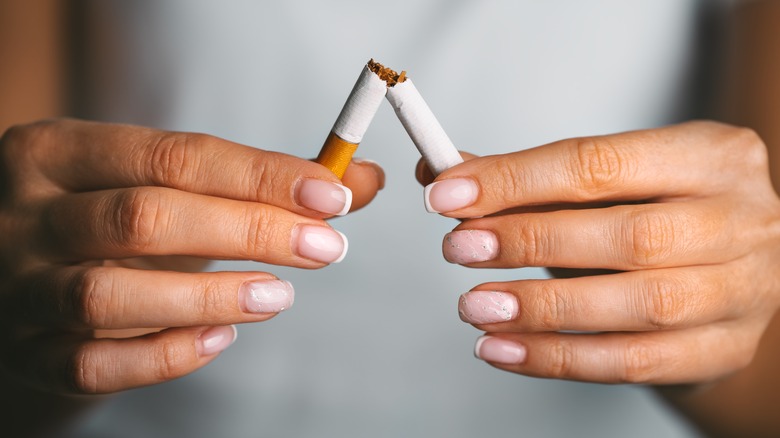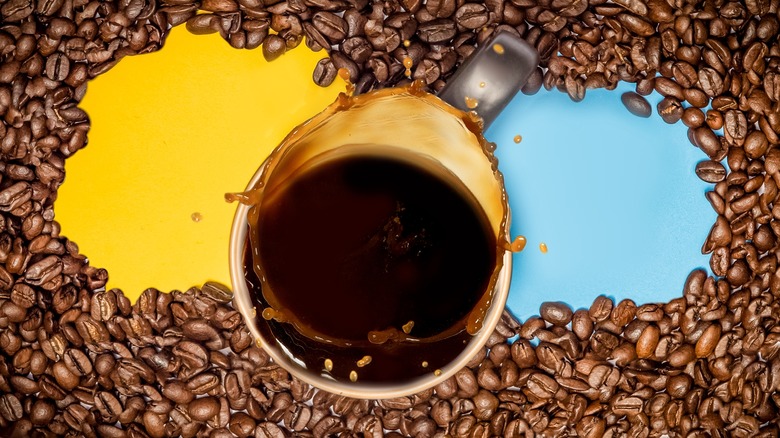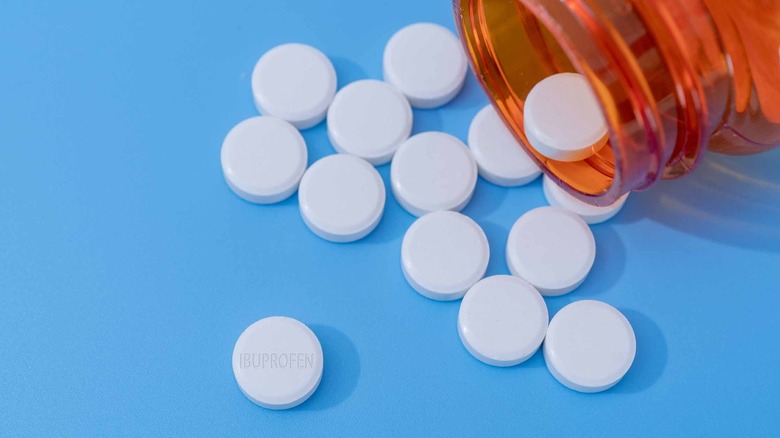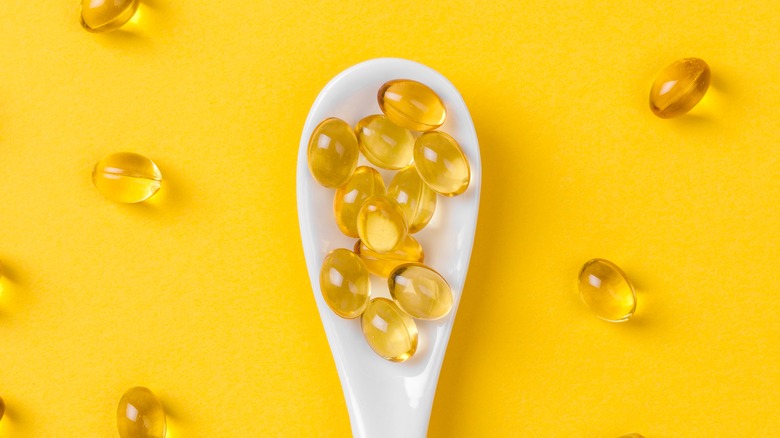Things You Should Never Do Before Getting Plastic Surgery
Modern cosmetic surgery actually has ancient roots. Plastic surgery takes its name from the Greek "plastikos," meaning to give form or mold (via CNN). Documents show that eons ago, Egyptians not only treated injuries surgically, but also used natural tools to fashion early prosthetics and reset injured noses into aesthetically desired positions.
Centuries later, World War I led to more innovation in surgical technique in general, and in post-facial injury reconstruction surgery in particular. By the time World War II ended, plastic surgery was safer than ever, wartime plastic surgeons were looking for new work, and Americans had more disposable income. Subsequently, by the 1960s, Americans were more commonly pursuing surgery for purely cosmetic reasons, despite the fact that plastic surgery techniques still largely developed for trauma and cancer patients.
Today, cosmetic surgery is a familiar part of American culture. According to statistics from the American Society of Plastic Surgeons (ASPS), there were about 15.6 million cosmetic procedures done in the United States in 2020, with Americans spending $16.7 billion. As these procedures become utilized at higher rates, safety and health practices have been developed to help patients effectively prep before and recover after surgery.
The ASPS emphasizes that it's important to follow your surgeon's treatment and recovery recommendations. But what are some of the things your provider will advise you not to do before plastic surgery?
Smoke or vape
According to the Cleveland Clinic, it's important to stop smoking or vaping before undergoing surgery. Smoking can irritate your lungs during surgery, leave you feeling nauseated, and even hinder your body's recovery afterward. This is unsurprising, given that the heart and blood vessels are affected by smoking (via the FDA).
Cigarettes contain both carbon monoxide and nicotine, which decrease oxygen circulation and increase your vulnerability to cardiac issues during and after an invasive surgical procedure. This can also compromise air flow to the lungs, increasing risk of postoperative lung complications, per the World Health Organization (WHO). Immune system functioning and your body's ability to heal incisions can also be negatively impacted by the chemicals in smoke.
The WHO suggests that quitting smoking at least 4 weeks before surgery decreases incidences of postoperative surgical complications and improves recovery results. Findings of a study by WHO in conjunction with the World Federation of Societies of Anaesthesiologists (WFSA) reveal that after smoking cessation, every week beyond the one month mark leads to a 19% improved health outcomes, because of restored blood flow to tissues and organs throughout the body.
Drink alcohol
Prior to your operation, you should let your plastic surgeon know about your lifestyle and health habits, including your level of alcohol consumption (via Cleveland Clinic). Your doctor will ask you how many drinks you have weekly or daily. If you are drinking excessive alcohol regularly, it could lead to complications during surgery.
Alcohol withdrawal during surgery can cause the central nervous system to produce symptoms such as sweating, hallucinations, tremors, seizures, or even death. According to Memorial Sloan Kettering Hospital, regular alcohol use can also present a higher likelihood of other surgical dangers, like increased hospital stay recovery times, heart issues, or infection. If you are having trouble not drinking alcohol, be sure to be open with your provider.
If you feel ashamed or afraid to talk about your alcohol use, it may help to remember that privacy and confidentiality laws protect your personal healthcare information. Your health and safety are important to your provider. They can help you make a plan for the best plastic surgery recovery possible.
If you or anyone you know needs help with addiction issues, help is available. Visit the Substance Abuse and Mental Health Services Administration website or contact SAMHSA's National Helpline at 1-800-662-HELP (4357).
Consume excessive caffeine
High levels of caffeine consumption before plastic surgery are concerning for a couple of reasons, according to the Aesthetic Report. First off, surgeons often want patients to stop their regular caffeine consumption before surgery, simply to ensure that the patient will not go through withdrawal on the day of surgery (which, as any coffee drinker could attest, is anything but pleasant). Depending on your procedure and surgeon, your provider may just ask you to cut back instead of completely avoiding caffeine. Talk to your doctor about specifics.
Additionally, some research also suggests that caffeine may slow the rate of postoperative wound healing. Add this information to the fact that excessive caffeine consumption can lead to dehydration and an anxious, elevated heart rate on the day of your procedure, and you may want to steer clear of that extra coffee or tea in the days before surgery. Also, beginning after midnight on the day before surgery, your provider will likely ask you not to consume any food or drink in general.
Eat poorly
During the weeks before surgery, eating nutritious and healthy meals is essential. Your surgeon and anesthesiologist will create a pre-surgery meal plan (per All-American Home Care). Doctors typically recommend avoiding excess salt and sugar intake during this time. Foods that are devoid of nutrition, such as sweets or chips, should be not be eaten.
Beginning 2-3 days before your scheduled plastic surgery, healthy meals consisting of lean proteins like chicken or fish, whole grains, and produce can ensure you meet your nutritional needs. Lean meats and dark greens are especially beneficial because they can ensure you get enough nutrients that are beneficial for your overall recovery.
As you get closer to surgery, your provider may have you stop consuming certain kinds of food and liquids hours before your operation (per the NHS). It's important to honor this plan for safety and health reasons, partly because food aspiration and lung issues are real risks during surgery. If you consume something outside of the plan, let your provider know right away.
Stop exercising
Although patients may feel they should rest before surgery, maintaining and even increasing regular activity levels is important. As Dr. Joyce Wahr, professor of anesthesiology at the University of Minnesota Medical School, put it (via U.S. News):"I'd like all patients to increase their physical activity level in the week before their surgery."
If you have fitness routines, do not stop your regularly scheduled routine. Otherwise, walking a half hour daily can help you prepare. Daily activity in the weeks before surgery can lend itself to an expedited postoperative recovery. This is also important after surgery, as a lack of movement can create an increased risk of health issues such as life-threatening blood clots. Beyond this, or cosmetic surgery on the body, maintaining a stable weight is often needed.
"Sometimes people think they should become inactive because they're about to have surgery," says Wahr, who emphasized how important it is for patients scheduled for surgery to "continue to be active" or become more physically active than they typically are.
Overschedule for weeks after surgery
Recovery time after cosmetic surgery requires time and patience. Your surgeon will provide care instructions and follow-up appointments, but it's your responsibility to set yourself up for the best outcome possible.
The Aesthetic Society suggests that thinking about where you'll be recovering, who your helpers might be, and what responsibilities you can take off your plate during your recovery time are all things that you do ahead of time to prepare.
Plan to clear your schedule of stressful tasks. Arrange your recovery space and cupboards so that essential items are easily accessible. Make sure that you will be able to reach water, snacks, phone charger, or entertainment easily. Cleaning your house ahead of time can make for less stress after surgery, as well. Meal prepping or having a plan ahead for dinnertime may also be wise. If you are a parent, plan for childcare or rides to school. Last but not least, take an appropriate amount of time off work. Decreasing your responsibility load and stress levels can leave you space to focus on rest and allowing your body to heal.
Take anti-inflammatories
Surgeons often warn against taking anti-inflammatory medications or NSAIDs more than a week before plastic surgery, according to the Aesthetic Report. Aspirin can cause excessive bleeding which is unsafe during surgery. It can also lead to more bruising after surgery. Ibuprofen (e.g., Advil, Motrin) can also increase risk of added bleeding. As always, communicate with your licensed medical providers in order to create an individualized treatment plan, including a plan for adjusting your medication use before your cosmetic surgery.
Prescription anticoagulants (blood thinners) like warfarin can also be a concern before surgery. Your cosmetic doctor and other prescribing doctors will go over all of your medications and help you to make a safe plan for the smoothest possible surgery and recovery (via Johns Hopkins Medicine). Just be sure to communicate openly with your medical team and make sure you understand your treatment plan instructions. If you have questions or concerns, seeking clarification is best.
Wear makeup or nail polish
It's best to avoid wearing nail polish or makeup before cosmetic surgery. The Center for Young Women's Health recommends removing nail polish before surgery, to enable doctors and nurses to check your blood circulation by looking at your nails. You will likely also be asked to remove at least two acrylic nails, so that a pulse oximeter can be attached to monitor your oxygen levels during and after surgery.
Makeup should also not be worn during plastic surgery, for a couple of reasons. First, your lack of blink reflex during surgery means that mascara or other makeup particles can damage the eyes. Secondly, these materials can be flammable or toxic. Finally, they make for a less sterile environment and can increase vulnerability to skin infection. Makeup can also leave skin discoloration if on during surgery. "I request patients to refrain from using makeup for two weeks near incisions to prevent irritation or accidental pigmentation," says plastic surgeon Daniel J. Liebertz, MD (via NewBeauty).
Take vitamin E
The National Institutes of Health indicate that consuming excess vitamin E may increase bleeding risk. While Americans spend over $25 billion yearly on vitamin supplements with good intentions (per Today), there are times where supplements like vitamin E are contraindicated. Research shows that major or even fatal bleeding events are more likely if a patient consumes high amounts of vitamin E.
The American Society of Anesthesiologists has urged medical providers to gather info about patient vitamin and supplement regimens and to advise for surgery safety accordingly. Since high amounts of vitamin E can cause both blood pressure issues and increased bleeding in surgery, it's wise to discuss vitamin E consumption with your plastic surgeon. Your medical provider will likely advise you to stop taking vitamin E in the days leading up to your cosmetic surgery procedure. Be forthcoming about your consumption of vitamin E and other vitamin or herbal home supplements, so that your doctor can help ensure your procedure and recovery are as safe as possible.










